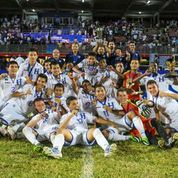By Paul Nicholson in Grand Cayman
August 26 – “This is where it all starts. CONCACAF has a duty to develop its youth players and these are the seeds to expand the vision of youth development. How many opportunities do these young players get to play against the best of their own age group? Before this they had no opportunity,” said CONCACAF president Jeffrey Webb as the final of the confederation’s U15 boys tournament came to a close in the Cayman Islands.
A total of 22 teams, the largest number of any CONCACAF competition, played out the inaugural tournament with Honduras beating Guatemala 2-1 in a final watched but about 2,500 spectators at the Truman Bodden Sports Complex in George Town.
“The tournament has been a huge success on a number of levels. The players, managers and coaches have all come up to me and thanked us for staging this. We have given these kids a better footballing chance. They are our future.
“For some of these guys it is their first time away from home, the first time they have had a passport, the first time they have been in an airplane, their first time in a hotel.”
The tournament also provided the backdrop for two other core pieces of CONCACAF development that has showcased a confederation forcing itself out of a dark place after the various corruption scandals that had plagued its image, and progression.
Under the watchful eye of Alfredo Whittaker, head of referee development for CONCACAF, the tournament was refereed by 40 officials drawn predominantly from across the Caribbean.
“We picked these referees because they are the ones we think will become FIFA referees and move up to take charge of FIFA’s international fixtures. From this tournament we will evaluate their performances, make judgements and send reports on to FIFA,” said Whittaker.
Amongst the 40 was a female referee from Canada. “We invited her because we thought she was good but was not getting enough games. Her evaluation scores over the tournament were the best and she is refereeing the final. This is what development is about and getting the opportunity to find and let the best people come through.”
In parallel CONCACAF held the second of its coaching D license courses, its first stage qualification for coaches.
“Not only are we preparing the kids on the field but we launched our coaching D license course. We have 40 coaches here from around the region, US, Canada and so forth, who are participating in the coaching qualification D license. Everything we do is geared on us improving and evolving and geared ultimately to better football on the field and ultimately winning the world championship,” said Webb.
The energy and enthusiasm generated in the Caymans has been infectious and Webb is naturally proud of how his home country has stepped up to support him. “Cayman has done a tremendous job as hosts of this event. There have been so many elements to make this successful.”
As a beaming Jamaican FA president Captain Horace Burrell said to this reporter at the closing party for the ambassadors – Cayman’s equivalent, and equals of London’s much feted gamesmakers – “One Life”. Not quite Marley lyrics but you get the point. Those still standing at the end of a remarkable two weeks of football, will reflect proudly on a job well done.
Many will be back in the Caymans in January for the CONCACAF U20 womens tournament and again next summer for the inaugural U15s girls tournament.
Contact the writer of this story at moc.l1745680470labto1745680470ofdlr1745680470owedi1745680470sni@n1745680470osloh1745680470cin.l1745680470uap1745680470
